The topic of this article may not meet Wikipedia's notability guidelines for products and services .(February 2021) |

Space Hop is an educational board game about astronomy published by Teaching Concepts in 1973.
The topic of this article may not meet Wikipedia's notability guidelines for products and services .(February 2021) |

Space Hop is an educational board game about astronomy published by Teaching Concepts in 1973.
Space Hop is a board game for 2–4 players that is designed to teach the players about the Solar System.
The game has the following components: [1]
Each player rolls the dice and starts their token on the space port corresponding to their roll. Each player draws a mission card which gives a clue as to the player's destination. [1]
The active player draws a hop card. If the active player is sure about their destination, they can spend their turn moving towards it. If the player is not sure, they can use the decoder wheel to decode the name of their destination, but doing so will use up their entire turn. [1]
The player can choose to navigate towards their destination by using their accumulated hop cards to hop from portal to portal. Or they can roll the dice and move the indicated number of spaces, avoiding asteroids, comets, and other space ships. Once close to their destination, the player must roll the exact number needed in order to land. [1]
Once at the destination, the player draws an SNC card (or two cards if their mission card had a star). These cards award the player with credits. The player then draws a new mission card, and play continues. [1]
The first player to amass 25 credits wins the game.
Space Hop was designed by Helmut Wimmer, a resident artist at New York's Hayden Planetarium at the time of the game's publication. It was published by Teaching Concepts in 1973. [1]
In December 1973, Ellen Stock of New York Magazine recommended Space Hop and the other four games produced by Teaching Concepts as good educational Christmas gifts. [2]
In 1977, Pamela Riley and Patricia Powers named Space Hop as a potentially positive influence on non-sex-biased career options for 4th grade students. [3]
In the same year, Paul Hounshell and Ira Trollinger called Space Hop "An interesting and well-designed game for junior and senior high school students. It is fun for students to play and, in the process, they will learn many facts about the nature of the universe and space travel." They concluded "One class period is required to play the game but there should be time allotted to discuss various aspects of the universe and travel within it." [4]
In 1987, Ellen Lederman chose Space Hop for inclusion in her book Educational Toys and Games: A Practical Guide to Selection and Utilization, noting that the game "Increases knowledge about the planets." [5]
In a retrospective review almost 50 years after the game's publication, Scott Brady did think the game might have some educational merit but questioned its game value. He noted that the game was designed by a specialist in the field, not a game designer, saying "As with most other educational games, there is no revolutionary game play to be found." Brady thought the real value in buying a used copy would be to frame the attractive game board. [1]

Monopoly is a multiplayer economics-themed board game. In the game, players roll two dice to move around the game board, buying and trading properties and developing them with houses and hotels. Players collect rent from their opponents and aim to drive them into bankruptcy. Money can also be gained or lost through Chance and Community Chest cards and tax squares. Players receive a salary every time they pass "Go" and can end up in jail, from which they cannot move until they have met one of three conditions. House rules, hundreds of different editions, many spin-offs, and related media exist. Monopoly has become a part of international popular culture, having been licensed locally in more than 103 countries and printed in more than 37 languages. As of 2015, it was estimated that the game had sold 275 million copies worldwide. The original game was based on locations in Atlantic City, New Jersey, United States with the exception of Marvin Gardens.

Steve Jackson Games (SJGames) is a game company, founded in 1980 by Steve Jackson, that creates and publishes role-playing, board, and card games, and the gaming magazine Pyramid.
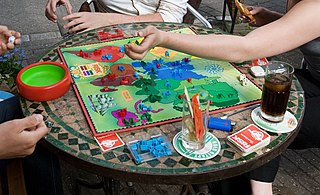
Risk is a strategy board game of diplomacy, conflict and conquest for two to six players. The standard version is played on a board depicting a political map of the world, divided into 42 territories, which are grouped into six continents. Turns rotate among players who control armies of playing pieces with which they attempt to capture territories from other players, with results determined by dice rolls. Players may form and dissolve alliances during the course of the game. The goal of the game is to occupy every territory on the board and, in doing so, eliminate the other players. The game can be lengthy, requiring several hours to multiple days to finish. European versions are structured so that each player has a limited "secret mission" objective that shortens the game.
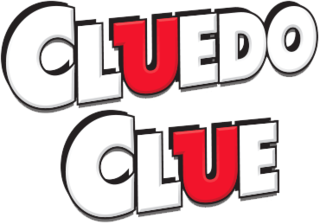
Cluedo, known as Clue in North America, is a murder mystery game for three to six players that was devised in 1943 by British board game designer Anthony E. Pratt. The game was first manufactured by Waddingtons in the United Kingdom in 1949. Since then, it has been relaunched and updated several times, and it is currently owned and published by the American game and toy company Hasbro.
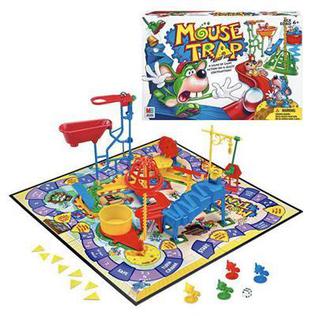
Mouse Trap is a board game first published by Ideal in 1963 for two to four players. It is one of the first mass-produced three-dimensional board games. Players at first cooperate to build a working mouse trap in the style of a Rube Goldberg machine. Then, players turn against each other to trap opponents' mouse-shaped game pieces.
In tabletop games and video games, game mechanics are the rules or ludemes that govern and guide the player's actions, as well as the game's response to them. A rule is an instruction on how to play, a ludeme is an element of play like the L-shaped move of the knight in chess. A game's mechanics thus effectively specify how the game will work for the people who play it.

SolarQuest is a space-age real estate trading board game published in 1985 and developed by Valen Brost, who conceived the idea in 1976. The game is patterned after Monopoly, but it replaces pewter tokens with rocket ships and hotels with metallic fuel stations. Players travel around the Sun acquiring monopolies of planets, moons, and man-made space structures. They seek to knock their opponents out of the game through bankruptcy, as well as optional laser blasts and dwindling fuel supplies.

Battle Masters is a board game by Milton Bradley made in collaboration with Games Workshop in 1992. It is a game that simulates the type of battles as seen in Warhammer Fantasy Battle, but with much simpler game mechanics not based on its parent game. The game, like its sibling Milton Bradley/Games Workshop partnerships HeroQuest and Space Crusade, was designed by Stephen Baker, who later went on to design the popular game Heroscape.
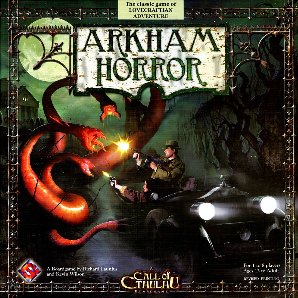
Arkham Horror is a cooperative adventure board game designed by Richard Launius, originally published in 1987 by Chaosium. The game is based on Chaosium's roleplaying game Call of Cthulhu, which is set in the Cthulhu mythos of H.P. Lovecraft and other horror writers. The game's second edition was released by Fantasy Flight Games in 2005, with a third edition in 2018.

The Ungame is a non-competitive conversation board game created by Rhea Zakich in 1972 and published in 1973. In the game, players move around the board with the aid of a die and answer questions about themselves on cards, while the other players must listen and respond only when prompted.
The following outline is provided as an overview of and topical guide to games and gaming:
A number of related games under the Yahtzee brand have been produced. They all commonly use dice as the primary tool for game play, but all differ generally. As Yahtzee itself has been sold since 1954, the variants released over the years are more recent in comparison, with the oldest one, Triple Yahtzee, developed in 1972, eighteen years after the introduction of the parent game.
The London Cabbie Game or Cabbie is a board game designed by David Drakes and first published by Intellect Games in 1971. Players drive taxicabs through the streets of London, with the winner being the player who accumulates the most tips and fares in a specified time limit.
Flibbix is a dynamic board game by Merillian for two to five players, in which players build their own game board using magnetic game board tiles, check off custom rules on a "Make your own Rules" sheet, and then play.

A game is a structured form of play, usually undertaken for entertainment or fun, and sometimes used as an educational tool. Many games are also considered to be work or art.

Monopoly: The Mega Edition is a special variant of the popular board game Monopoly. The game was first published on May 22, 2006 by Winning Moves Games USA in the USA. A UK version was adapted on October 1, 2007.
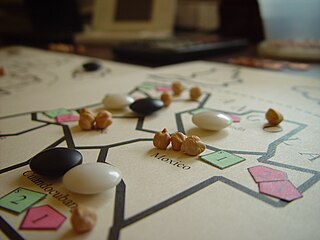
Game design is the process of creating and shaping the mechanics, systems, and rules of a game. Games can be created for entertainment, education, exercise, or experimental purposes. Increasingly, elements and principles of game design are also applied to other interactions, in the form of gamification. Game designer and developer Robert Zubek defines game design by breaking it down into its elements, which he says are the following:

Freedom: The Underground Railroad is a 2013 co-operative board game designed by Brian Mayer and published by Academy Games, their first game in the Freedom Series. The game has drawn positive attention for its approach and handling of the topic.

Cartographers is a roll and write board game designed by Jordy Adan and published in 2019 by Thunderworks Games. It is part of the Roll Player universe. In the game, players aim to draw terrains based on drawn cards that award points based on the relevant letter cards. The game received positive reviews, and was nominated for the Kennerspiel des Jahres, but lost to The Crew. It was also runner-up to Parks for the Best Family Game of the 2019 Board Game Quests Awards. An app for solitary play was released in 2020.